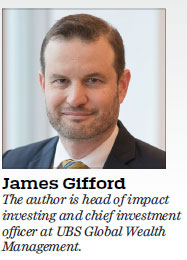Sustainable investing seen as the 'new normal' in future
Updated: 2019-03-15 07:53
(HK Edition)
|
|||||||
In Asia, sustainable investing is the new kid on the block. Though still in its early stages, investment strategies that incorporate environmental, social and governance (ESG) issues into investment processes are gaining traction among Asian investors, and that's good news. The United Nations estimates that the annual additional investment needed to achieve the sustainable development goals (SDGs) is between $2 trillion and $3 trillion. If you consider the fact that household wealth globally stood at $250 trillion in 2015, it's clear the private sector has an important role to play in narrowing this fund gap and achieving the SDGs.
One of the biggest misconceptions of sustainable investing is that taking ESG considerations into account in investment decisions compromises financial returns. On the contrary, the evidence points to a strong business case for investing in companies that treat their workers well, are environmentally conscious and implement sustainable practices, as these are often the companies best at managing risks and exploiting opportunities in a fast changing world. The BP oil spill in 2010 is a good example of how companies implementing best practice safety protocols is as much of a financial decision as it is a safety issue. And, as we automate processes and more work shifts further toward knowledge and creative work, empowering employees becomes a prerequisite to delivering growth and innovation. Increasingly, we are seeing sustainable investments perform on par with, and sometimes exceed, traditional financial investments.

Investors are clearly getting this message. According to our UBS Investor Watch 2018, in which we surveyed more than 5,300 investors in 10 markets on sustainable investing, we found that Chinese mainland and Hong Kong investors are increasingly engaging in these strategies. In Hong Kong, 85 percent of the investors surveyed say they're interested in sustainable investing. On the Chinese mainland, almost all the investors we surveyed are interested in the concept of sustainable investing, with 74 percent believing that sustainable investing will become "the norm" in 10 years' time. They are also putting this into practice - among those who invest sustainably in Hong Kong, the average allocation to sustainable investment is quite significant, at 41 percent which is higher than the global average of 36 percent. Looking into the future, 63 percent of Chinese mainland investors and 58 percent of Hong Kong investors believe they will hold sustainable investments in five years' time. Chinese mainland investors also believe there is no trade-off between impact and returns. On the contrary, 72 percent said they expect better returns through sustainable investing. Investors are expecting sustainable investing to grow significantly in popularity, and become the new normal in the near future.
We are also seeing growing interest from clients across all segments, but particularly women and millennials, who often have a greater affinity toward sustainable investing. These demographics share commonalities: Their economic power is rising, they take a more holistic approach to investments, and they care more deeply about aligning their investments with their values. Research from BCG found that 65 percent of women judge an investment's success based on social, political or environmental outcomes, versus 42 percent of men. Similarly, millennials are twice as likely as other age groups to sell an investment due to perceived unsustainable corporate behavior. Powered by the belief that management of ESG risks and opportunities directly affects business performance, values alignment has become a strategic imperative for companies wishing to capture the women and millennial demographic.
As the industry works toward making sustainable investing a mainstream investment approach, it's crucial that the supply of high-quality products and investment opportunities meets the growing demand. Through partnering with financial firms and multilateral development banks to find innovative and sustainable solutions, wealth managers are offering private investors the opportunity to direct their money toward investments that align with their values, generate positive social and environmental outcomes, and produce competitive financial returns.
At UBS, we launched the world's first 100-percent sustainable, cross-asset portfolio last year. It is the first time that private clients can access a 100-percent sustainable cross-asset portfolio, implementing ESG across all liquid equities and bonds strategies. The strong pick-up in numbers we have seen throughout 2018 is evidence of how clients understand that sustainability is a factor for better informed investment decision making which can lead to superior investment outcomes over time. It also resonates strongly with clients who want to align their investment portfolios closer with their values.
In addition, wealth managers also act as the bridge between impact entrepreneurs and clients to bring some of the best ideas into being. While sustainable investing has become a sophisticated practice, the concept remains simple. If we mobilize the trillions of dollars of private wealth toward investing in profitable companies that actively work toward leaving a positive footprint, we're directly creating a better world in which to live, as well as securing our financial future.
|
A huge oil mass floats in the Gulf of Mexico near Orange Beach in Alabama, the United States, on June 18, 2010. The BP oil leak that persisted for some four months well into September dealt a fatal blow to local marine and wildlife habitats, as well as the fishing and tourism industries. Kari Goodnough / Bloomberg |
(HK Edition 03/15/2019 page13)
